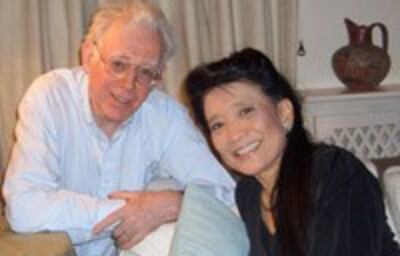
HONG KONG—Former Red Guard and internationally renowned author Jung Chang is hurrying to translate her latest book on Mao Zedong into Chinese, because she says she’s eager to challenge the popular histories that justify Chinese Communist Party (CCP) rule.
Mao: The Unknown Story, co-authored by Chang and her husband, Russia expert Jon Halliday, first reached readers of English earlier this year. Chang, whose autobiographical Wild Swans was an international best-seller, told RFA's Mandarin service in a recent interview that the book resulted from 12 years' intensive research.
The couple’s investigations included taped interviews with surviving members of Mao’s inner circle, previously unpublished handwritten notes by Mao’s first wife, and archives of the former Soviet Union in Russia.
Mao hagiography exploded
Mao is still a sanctified figure in the Chinese Communist Party, but I hope that people will start to question whether that is appropriate, once they have read our book.
They also extensively re-examined material already in the public domain, finding much to explode popular communist mythology surrounding Mao and the Chinese revolution.
“I decided to write about Mao because he is one of the major historical figures of the last century. Because I think that most people in the world, including Chinese people, actually don’t know very much about him,” Chang said.
The Soviet archives unearthed a far closer relationship between the CCP and Soviet leader Josef Stalin that was previously known, Chang said. This challenged the popular view of China’s revolution as having resulted from mass support for the egalitarian communists who bravely fought off the Japanese invasion and handed out food and education to millions of oppressed, she said.
“In the book...we discuss how it became possible for the CCP to gain power. All that stuff about ‘guns and millet’ and seeing off [KMT Nationalist leader] Chiang Kai-shek is just legend,” she said. “The CCP set up a strong command center in northern Manchuria, where they received massive support from incoming Soviet troops.”
“There was a huge movement of Soviet troops into China at the end of the war against Japan in 1945. They covered a territory that was much greater than the territory they held in Eastern Europe. And they used their military bases to help Mao Zedong win power,” Chang told RFA.
Chiang Kai-shek's son held hostage
“Mao used to talk about sitting in a comfortable sofa, with his back against the Soviet Union and Mongolia and North Korea as the two arms. So it was nothing to do with the failure of Chiang Kai-shek, or the support of ordinary people for the communists,” she added.
On the beginning of the Long March, often portrayed in popular culture as a heroic retreat in the face of Nationalist attack, Chang said she and Halliday found fresh insights from the Russian end of their research.
“The communists escaped because Chiang Kai-shek let them go, because his son Chiang Ching-kuo was being held as a hostage by Stalin in the Soviet Union. Chiang Ching-kuo was Chiang Kai-shek’s only son, so he struck a deal with Stalin—he would allow the CCP to continue to exist if Stalin would spare his only son,” Chang said.
They also found documents in Russia that shed new light on the Xian Incident of December 1936, in which Manchurian general Zhang Xueliang kidnapped Nationalist Generalissimo Chiang Kai-shek.
Mao used to talk about sitting in a comfortable sofa, with his back against the Soviet Union and Mongolia and North Korea as the two arms. So it was nothing to do with the failure of Chiang Kai-shek, or the support of ordinary people for the communists.
“Zhang Xueliang kidnapped Chiang Kai-shek not in order to win the war against Japan, but because at the time he had strong ties with the Russians. We saw this in the Russian archives. Zhang’s aim was to overthrow Chiang Kai-shek and take his place,” Chang said.
Notes from Mao's first wife
“At that time a lot of people were trying to do this, and they all knew that this could be achieved only through cooperation with the Russians. So Zhang made a great effort to build ties with the Soviet Union. And the Soviets put Zhang in touch with the CCP, to maintain support for the communists,” she added.
Among other finds were a set of handwritten papers belonging to Mao’s first wife, Yang Kaihui.
The book asserts that Mao used his later wife Jiang Qing to carry out tasks for him that no one else would do, ensuring that she and the Gang of Four would carry most of the blame for the disastrous Cultural Revolution (1966-76).
“Mao called a meeting with his top generals when he was about to die and told them that they shouldn’t just let things carry on peacefully after his death—that they should stage a coup and arrest Jiang Qing and her cronies. That’s why the Gang of Four was arrested shortly after Mao’s death,” Chang said.
Chang said she hoped her Chinese version of the book would be ready by the end of the year. “Mao is still a sanctified figure in the Chinese Communist Party, but I hope that people will start to question whether that is appropriate, once they have read our book.”
“Mao is responsible for the deaths of 70 million people. Thirty-eight million of those died during the famines of the Great Leap Forward from 1958-61. On a moral level, there isn’t a single good thing to say about him.”
“He is not the hero of the Chinese people, and his portrait should not be hanging in Tiananmen Square, and the Chinese people should be told the truth about him,” she said.
Original reporting in Mandarin by Han Qing. RFA Mandarin service director: Jennifer Chou. Translated and written for the Web in English by Luisetta Mudie. Edited by Sarah Jackson-Han.
